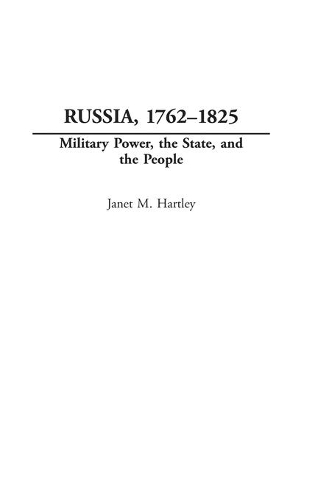
Russia, 1762-1825: Military Power, the State, and the People
(Hardback)
Publishing Details
Russia, 1762-1825: Military Power, the State, and the People
By (Author) Janet M. Hartley
Bloomsbury Publishing PLC
Praeger Publishers Inc
28th February 2008
28th February 2008
United States
Classifications
Tertiary Education
Non Fiction
Ethnic groups and multicultural studies
947.07
Physical Properties
Hardback
332
Description
A study of the Russian Empire at the peak of its military power and success (1762-1825), this important book examines how a country with none of the obvious trappings of modernization was able to significantly expand its territory. Russia's military and naval victories culminated in the triumphal entrance of Russian forces into Paris in 1814 in celebration of the defeat of Napoleon. Hartley's treatment is wide-ranging and discusses many aspects of the nature of the Russian state and society-not merely issues such as recruitment, but also institutional, legal, and fiscal structures of the state, the unique nature of Russian industrialization and social organization at the urban and village level, as well as the impact on cultural life. She covers the reign of two of Russia's most prominent rulers: Catherine II (1762-1796) and Alexander I (1801-25). How could a country lacking modernized structures-political, institutional, social, fiscal, economic, industrial, and cultural-sustain this level of military effort and support the largest standing army in Europe What impact did the strain of this commitment of men and money, including the invasion of 1812, have on the state and society-particularly on those who were either conscripted or the dependents they left behind Despite the success of the Russian state, by 1825 the strains would become almost unsustainable.
Reviews
In her by now customary manner Janet Hartley has produced another book that is rich in detail, sensible in analysis, and attentive to the careful reconstruction of historical events. Lucidly written and extensively documented, Russia, 1762-1825 explores the development of Russian military power with reference to state-building and the cost to society. . . . Hartley ends her book with an enlightening and original discussion of the military colonies established by Alexander I and abolished by his successor, Nicholas I. . . . Defeat in the Crimean War showed that Russia's military might could not be sustained without significant economic and social change. Yet until the 1850s Russia remained stable and militarily powerful despite the revolutionary upheavals affecting other parts of Europe. Thanks to the hard work of Janet Hartley, scholars have an intelligent account of why this was so. * The Russian Review *
Hartley (London School of Economics) puts this significant period of Russian history into perspective by focusing on the connections between the economic growth of Russia and the Russian military. . . . A worthy addition to any academic library. . . . Recommended. All levels/libraries. * Choice *
[W]e have every reason to welcome Janet M. Hartley's new book, which covers considerable ground. * American Historical Review *
In many respects, Hartley's examination is a fascinating one. . . Hartley offers an important new consideration of the significance of the Russian military in the society that sustained it during a crucial period. * Slavic Review *
Author Bio
Janet M. Hartley is Professor of International History and Pro Director at the London School of Economics and Political Science. She is the author and editor of many books and articles on Russian history and Anglo-Russian relations in the eighteenth and early nineteenth centiuries. Her books include: Alexander I (1994), A Social History of the Russian Empire, 1650-1825 (1999), and Charles Whitworth: Diplomat in the Age of Peter the Great (2002). She has also written extensively on the impact of the Napoleonic Wars on Russia.
